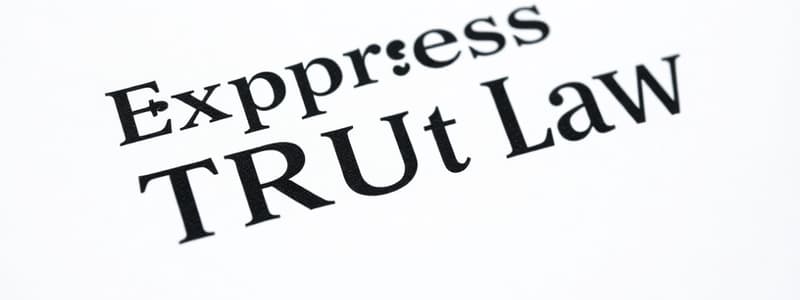Podcast
Questions and Answers
What primary role does the trustee have in a trust arrangement?
What primary role does the trustee have in a trust arrangement?
- To benefit from the property transferred
- To transfer the property back to the settlor
- To manage the property for specified beneficiaries (correct)
- To create legal personality for the trust
In the context of trust law, what is meant by 'equitable interest'?
In the context of trust law, what is meant by 'equitable interest'?
- The legal ownership of the property by the trustee
- The interest of the settlor in the trust arrangement
- The legal personality of the trust itself
- The right of the beneficiaries to enforce their claim to the property (correct)
Which case illustrates the principle that beneficiaries can enforce their rights even before receiving property?
Which case illustrates the principle that beneficiaries can enforce their rights even before receiving property?
- Brown v. Carter
- Smith v. Jones
- Taylor v. Phillips
- Saunders v. Vautier (correct)
What distinguishes the intention to create a trust from mere wishes or gifts?
What distinguishes the intention to create a trust from mere wishes or gifts?
Which type of trust involves the settlor explicitly declaring their intentions regarding property management?
Which type of trust involves the settlor explicitly declaring their intentions regarding property management?
What is a key factor in determining if an express trust has been created?
What is a key factor in determining if an express trust has been created?
Which of the following best defines 'Certainty of Intention' in the context of trusts?
Which of the following best defines 'Certainty of Intention' in the context of trusts?
Which requirement must be fulfilled for a trust to be enforceable?
Which requirement must be fulfilled for a trust to be enforceable?
In the context of trust creation, what does subjective intention refer to?
In the context of trust creation, what does subjective intention refer to?
What is a distinctive feature of a charitable trust?
What is a distinctive feature of a charitable trust?
What type of trust allows the trustee to exercise discretion in distributing assets?
What type of trust allows the trustee to exercise discretion in distributing assets?
What is an express trust primarily concerned with?
What is an express trust primarily concerned with?
Which of the following is an exclusion under the Personal Properties and Securities Act (PPSA) regarding trusts?
Which of the following is an exclusion under the Personal Properties and Securities Act (PPSA) regarding trusts?
What is a requirement for the creation of an express trust regarding intentions?
What is a requirement for the creation of an express trust regarding intentions?
Which of the following is NOT a method of creating an express trust?
Which of the following is NOT a method of creating an express trust?
What must an express trust demonstrate to fulfill the certainty of object requirement?
What must an express trust demonstrate to fulfill the certainty of object requirement?
Which type of express trust allows a trustee to decide on the beneficiaries?
Which type of express trust allows a trustee to decide on the beneficiaries?
Which of the following describes certainty of subject in an express trust?
Which of the following describes certainty of subject in an express trust?
What aspect does subjective intention refer to in trust law?
What aspect does subjective intention refer to in trust law?
What is a characteristic of a charitable trust?
What is a characteristic of a charitable trust?
Which of the following best defines the certainty of intention in establishing a trust?
Which of the following best defines the certainty of intention in establishing a trust?
Which type of trust specifically benefits individuals, such as family members?
Which type of trust specifically benefits individuals, such as family members?
What defines the certainty of object in the context of a trust?
What defines the certainty of object in the context of a trust?
Flashcards are hidden until you start studying
Study Notes
Express Trusts
- There are three types of express trusts: private, charitable, and discretionary.
- Private trusts are created for the benefit of individuals.
- Charitable trusts must be for a purpose that is recognized as charitable.
- Discretionary trusts allow the trustee to decide who will benefit or the quantum of each share.
- To create a trust, there must be a certainty of words, intention, subject, and object.
Certainty Requirements
- The object or objects of a trust are the beneficiaries.
- There must be a certainty of intention for a trust to be enforceable.
- The trustee owes fiduciary duties to the beneficiaries.
- The rule in Saunders v Vautier states that beneficiaries can demand the entire trust property at any time.
- The settlor transfers property to the trustee upon trust for the beneficiary.
- The trustee has legal interest in the property.
- The beneficiary has an equitable interest in the property.
- Property can be tangible or intangible.
Trust as distinct from a Gift
- A trust is distinguishable from a gift because the trustee has legal ownership of the property, while the beneficiary has an equitable interest.
PPSA Exclusions
- The PPSA (Personal Properties and Securities Act) excludes certain interests from its application, such as trusts.
- This includes transfers of beneficial interest in monetary obligations where the transferee holds the monetary obligation on trust for the transferor, and trusts over financial accommodation, if the recipient must use it according to conditions.
Studying That Suits You
Use AI to generate personalized quizzes and flashcards to suit your learning preferences.

